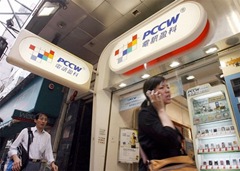In a striking move that further liberalises Oman’s telecoms sector, the regulator announced on October 25 that the winning bidder for the country’s second fixed-line licence was the PCCW-Awaser Oman consortium, and not the second mobile operator, Nawras, as had been widely expected. With fixed-line phone penetration in Oman standing at 10 per cent, and Internet penetration at a mere three per cent, Michelle Mills takes a look at PCCW, Hong Kong’s integrated telecoms provider and what the sultanate of 2.75 million stands to gain from the company’s extensive experience in broadband, quad-play and IPTV 
With more than 2.5 million fixed-lines and one million broadband customers in its home market of seven million people in Hong Kong, PCCW was always in a strong position to export its successful business formula to other markets, especially when pure fixed-line numbers are diminishing in many countries. As well as international presence in Europe, Africa, the Middle East, the Americas, mainland China and other parts of Asia through its subsidiaries, combined with a fattened purse, the Asian operator commands attention in markets it decides to enter.
“Naturally we are disappointed,” commented Ross Cormack, CEO of Nawras, after the regulator’s announcement that the mobile operator had not been successful in its bid to secure the second fixed-line licence. “We were very keen to have the opportunity to play a greater part in the bold vision for the development of communications in the sultanate with the fixed licence. We reaffirm our unwavering determination to keep on successfully providing all our customers with the best mobile experience possible, ensuring they always get more with Nawras.”
An informed source in Oman believes Nawras’ loss will dramatically affect its plans to further diversify and consolidate its position in the market, where it now occupies a formidable 43 per cent market share in the mobile sector, having only entered the market in March 2005.
“I know Nawras had been working hard on acquiring the fixed licence for months and it has always been a clear strategy for the company to try and get this when it came up. Had Nawras achieved the licence, it would have ended up being very strong,” the source commented.
The Telecommunications Regulatory Authority (TRA) said in its statement that the PCCW-Awaser Oman consortium achieved the highest marks in the technical and commercial evaluation, as well as the financial bid, and the licence award was a milestone in the liberalisation of the country’s telecommunications sector. A shortlist of six international telecoms operators and consortia had entered the bidding phase on August 29 from an original ten expressions of interest.
Nashiah al Kharousiyah of the TRA had earlier emphasised the criteria that would be taken into consideration with respect to judging the winning bidder.
“Experience is a must for the provision of international communication services. The net value of the assets of the operator or the member operator of the consortium should be more than US$200 million,” Kharousiyah stated. “To ensure fair competition, the member of the consortium should have no connection with Omantel, and the operator should have established or operated a fixed communications network in a competitive market,” she added.
PCCW’s Ayman Irshaid, vice president of business development for EMEA international projects, believes it is his company’s experience and converged services that gave it the competitive edge in the award process.

“PCCW in Hong Kong is by nature the innovative operator. It was the first to launch IPTV and it now has more than one million subscribers. It was also the first to launch quad-play – we are ahead of everybody else in the world in offering quad-play. By these services we can not only differentiate ourselves just from Omantel, but from any operator in the Middle East,” Irshaid contends.
PCCW’s flagship IPTV service in Hong Kong is known as ‘now TV’, has more than 160 channels, and has reached more than 35 per cent of the estimated 2.3 million households in the island city. Meanwhile, the quad-play service incorporating fixed-line, broadband Internet, mobile and TV, allows customers to tailor entertainment, infotainment, applications and transaction services via the four customer-delivery platforms. The flexibility of PCCW’s quad-play service means viewers can watch ‘now TV’ not only from their TV set, but also on their mobile phone, online PC, or the operator’s own fixed-line home multimedia device, branded the ‘PCCW eye’. In addition, the quad-play service offers ‘MOOV’ digital music streaming capabilities and ‘Snaap!’, by which consumers can share photos and videos stored digitally on the PCCW network and view them via the quad-play platforms.
The appeal and uptake of such advanced services by businesses and consumers in Oman in such an under-developed and untested market will remain to be seen. The TRA is pushing for high level offerings and investment that will contribute to the development of the economy and sector through a competitive market, modern world class telecoms services and an increase in job creation. Another challenge that PCCW will face in rolling out its network is the difficult mountainous terrain that dominates much of the Omani landscape.
The TRA has further added that once all the necessary requirements are met by the consortium by the deadline of November 9, it will forward its endorsement to the Minister of Transport and Communications. The Class 1 fixed-licence is being offered as a 25-year build-and-operate contract with a similar 15-year contract for broadband services. The consortium will have to pay seven per cent of gross revenues to the government as ongoing royalties and an upfront fee of OMR500,000 (US$1.3 million).
Irshaid expects PCCW’s fixed-line services to be launched in late 2009 or early 2010 under the brand name ‘Awaser’.
“Awaser is Arabic for ‘connecting people’, it’s about doing it for the community,” he says. “Once we receive the licence from the government, we have one year to build up the network and once we launch, it will then go to IPO.”
PCCW was fruitless in a similar attempt for Qatar’s second fixed-line licence, where it participated in a consortium in partnership with the Qatar Investment and Project Holding Company (QIPCO), losing out to Vodafone, which also holds the licence for as second mobile operator.
However, the Asian operator was successful in bidding for a fixed-line network in Saudi Arabia in 2007. It gained approval in February this year as one of three consortia to obtain licences, the other two being led by Bahrain’s Batelco and Verizon of the US. PCCW led the SITC consortium with local partner Marawid Group, and in addition to a fixed-line concession, it gained 40 MHz of WiMAX spectrum.
The SITC consortium plans to offer voice, broadband and triple-play services across the kingdom of 27.6 million people, made up of approximately four million households and 600,000 companies. The consortium forecasts a customer base in the third year of operation that comprises 215,000 residential and 5,000 enterprise customers. This is expected to climb to 842,000 and 18,000 respectively by the seventh year of operation, by which time it is also obliged to cover all regions of Saudi Arabia. Operations will mainly be served by FTTx technology, supplemented by WiMAX in remote areas.
PCCW has also signed an agreement with ITC, another Marawid Group company, which is one of Saudi Arabia’s two licensed data services providers. PCCW will provide management and technical support services across all areas including sales, marketing, customer operations, programme management, finance and network planning, and operations.
In its home market, PCCW has been making headlines of its own, where its shares had been suspended from trading for a period in October, pending further announcement regarding a possible privatisation proposal. PCRD, which is also controlled by PCCW’s chairman Richard Li, and China Netcom Corp are the major shareholders in PCCW and are reportedly considering a plan to jointly take the Hong Kong company private.
PCRD holds 22.54 per cent of PCCW, while China Netcom Corp, a unit of the mainland telephone group China Network Communications Group Corp, owns 19.84 per cent.





0 comments ↓
There are no comments yet...Kick things off by filling out the form below.
Leave a Comment